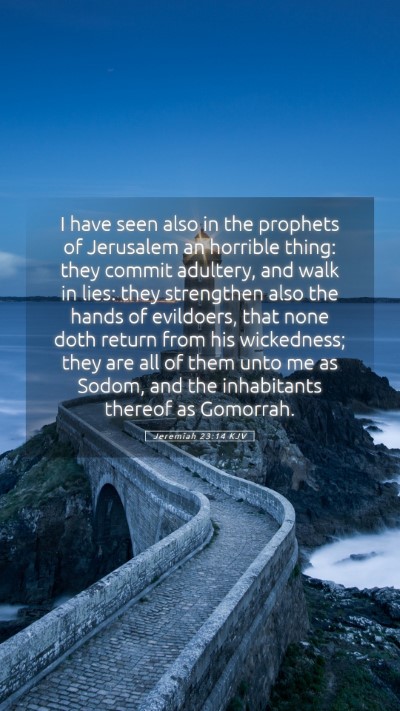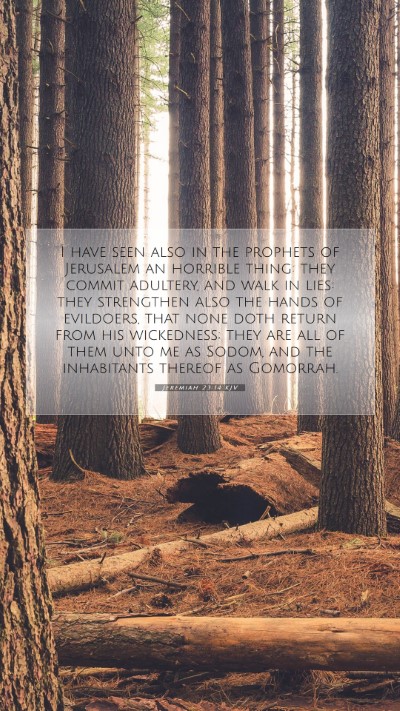Understanding Jeremiah 23:14
In this analysis of Jeremiah 23:14, we delve into the profound implications of this verse as interpreted through the lenses of renowned public domain commentaries, including those by Matthew Henry, Albert Barnes, and Adam Clarke. This exploration will provide essential insights for anyone seeking bible verse meanings, bible verse interpretations, and general bible verse understanding.
Context of the Verse
The prophet Jeremiah, serving during a significant period of upheaval in Israel, faced the challenge of false prophets leading the people astray. In Jeremiah 23:14, God speaks in judgment against these false shepherds who corrupt the truth and mislead the people. This verse underscores a critical theological and moral imperative for genuine leadership within the community of faith.
Verse Text
"I have seen also in the prophets of Jerusalem a horrible thing: they commit adultery, and walk in lies: they strengthen also the hands of evildoers, that none doth return from his wickedness: they are all of them unto me as Sodom, and the inhabitants thereof as Gomorrah."
Verse Commentary and Interpretation
-
Matthew Henry's Commentary
Matthew Henry emphasizes the moral decay stemming from both the spiritual leaders and the society at large. He notes that the prophets' actions - committing adultery and propagating lies - reflect a grave corruption. Henry likens the state of Jerusalem's prophets to the notorious cities of Sodom and Gomorrah, implying that such leaders are deserving of judgment.
-
Albert Barnes' Insights
Albert Barnes reflects on the nature of the prophets and their influence on the people. He argues that the prophets of Jerusalem were not just guilty of moral unfaithfulness but were also facilitating the moral decline of others. His commentary highlights the dangers of leaders who fail to call the people back to righteousness and truth, resulting in collective spiritual downfall.
-
Adam Clarke's Exegesis
Adam Clarke provides a detailed analysis, noting the serious implications of the leaders’ actions. He discusses the significance of 'walking in lies' and the importance of truth in spiritual leadership. Clarke emphasizes the inevitability of divine judgment on those who lead others astray, which serves as both a warning and an exhortation to remain steadfast in faith.
Application for Today
The implications of Jeremiah 23:14 extend beyond historical context to modern-day application. The verse serves as a vital reminder for contemporary leaders within the church and community. Those in positions of influence must embody integrity, truth, and righteousness to guide others effectively. The emphasis on accountability resonates in today’s discussions on moral leadership and ethical conduct.
Cross References
- Ezekiel 34:2-10 - Judgment against the shepherds of Israel.
- Matthew 7:15 - Warning against false prophets.
- 1 Corinthians 6:9-10 - Listing of unrighteous behaviors.
Conclusion
In conclusion, Jeremiah 23:14 provides significant insights into the responsibilities and the moral integrity required of spiritual leaders. As we engage in Bible study and scripture analysis, this verse calls for reflection on leadership, truth, and the consequences of failing to uphold God's standards. For those looking to deepen their Bible study insights and understanding of scripture, this passage serves as a critical point of reference.


